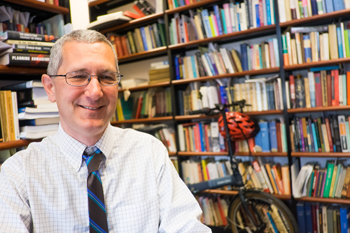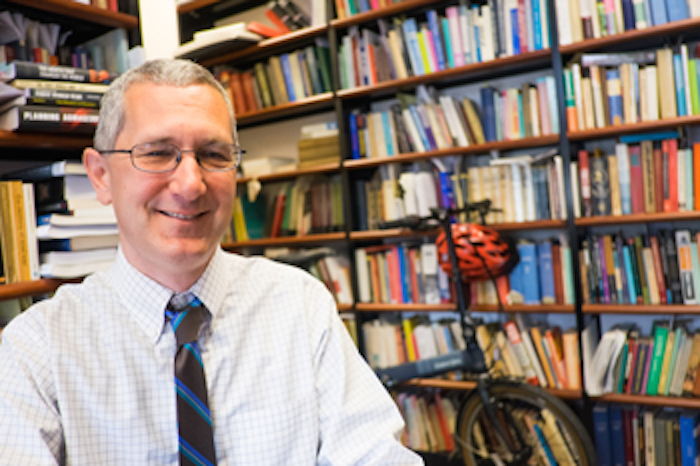
Interview conducted by Jaime Ortega with Professor Peter C. Caldwell*
1) People are afraid of autocratic governments because in many cases it subdues the will of the majority. Can dictatorships be a better solution in some cases than seeking a western democratic solution?
Before anything else, we need to clarify what is meant by “dictatorship.” The ancient model of dictatorship involved assigning extraordinary powers to a leader during a crisis: The powers were derived from, for example, a republic, and were intended to be used to restore order. This was the model familiar to the Founders in the US, when they granted George Washington extraordinary powers during the crisis of the Revolutionary War.
A second model is the one that Washington himself resisted: A dictator, usually from the military, who holds on to his powers after a crisis – perhaps invoking a permanent crisis as justification.
To these two kinds of dictatorships should be added a third: A dictatorship that emerges out of a revolution, when existing institutions are not yet in place. Revolutionary dictatorships may also be temporary – or permanent. Europe has known all of these kinds of dictatorship over the past hundred years.
The questions that follow assume that “dictatorship” and “democracy” are clearly distinguished; that is possible only if we ignore the transitional dictatorships.
2) Do some countries need dictatorships to run more efficiently or should all be run via democratically?
[one_half padding=”0 10px 0 0″][starbox][/one_half]We need to be clear: Both democracies and dictatorships can be singularly inefficient – and either can function well over a long period of time (depending on how “well” is defined). The argument of those calling for some form of dictatorship, usually on the right at present, is directed against the inefficiencies of democracy. And indeed, democracies in countries with severe disagreements can be not just inefficient, but dysfunctional. Where was the ground for compromise in Germany before 1933? Where in Spain before 1936? Italy, too, was divided before Mussolini came to power.
But to bemoan division – “pluralism” in the terms of mid-century authoritarian thought – is one thing, to conceive of a dictatorship as the solution to pluralism is another. Dictatorship does not solve the real divisions that lead to civil strife, it suppresses them. Divisions remain and interests continue to express themselves, but in complicated and opaque ways. Powerful interests seek the back channels to power, without having to fear exposure. The Marxist-Leninist claim that the Party could stand above mere interests and rule in the interest of some general will doesn’t accord with the ferocious infighting for influence, or the willingness to provide subventions for one project over another. Dictatorship does not solve pluralism.
Nor does it necessarily provide for peace. The less opinions can be expressed, the less real experience there is in democracy – and the worse the threat to peace over the long run. This is one important strand of the tragic story of the Arab Spring. In China, one wonders: On the one hand, the Party seems to have handled a transition to a more dynamic economy and a more open society with care and without any explosions: But will the result be a greater explosion down the line?
Now, let’s step back for a moment and think about the transitional forms of dictatorship. 1918-1919 in Germany: The old regime crumbles, the Social Democrats are thrust into power, and they know that they are essentially operating via dictatorship.
Their aims are three:
- a) To end the war;
- b) to maintain domestic peace;
- c) to enact a handful of basic social changes; and
- d) to hold elections of a new national assembly that can draft a democratic constitution.
There are many historians, who would disagree with me on this, but I consider their project a reasonable one – they could have gone farther with their dictatorial powers, but they instead bet on democratic representation. Why? In part on principle, in part to avoid an all out civil war.
Here is a second example, with which I do not agree, coming from the late historian Henry A. Turner: In 1932, Germany was falling apart at the seams, and the Nazis were threatening to come to power. Under these conditions a military dictatorship made sense. Turner is relying in part on hindsight to make his argument: What could have been worse than Nazism? He is also possibly putting too much faith in the military leadership, which was hardly a peace-loving group. Under such extraordinary conditions, when a democracy is self-destructing, of course, his argument has some merit. Even here, though, I wonder whether the solution would be a real solution.
But by “dictatorship” I think that you mean a specific form of government: Lasting military rule by an individual or junta. Setting democracy and dictatorship up against each other ignored the fact that 150 years ago, democratic republics were a rarity (and not always so “democratic” in our sense). Other alternatives were possible, from constitutional governments based on unequal representation to monarchies to empires with special representative bodies for different groups. It would be interesting to re-examine these 19th century solutions again, instead of staying trapped within a crude model of dictatorship vs. democracy.
3) Dictatorships are regarded as somehow negative for most people. What is the biggest public misconception regarding dictatorships?
The biggest misconception is that dictatorship as an institution is alien to our own system: See, again, George Washington. There are different kinds of dictatorships over history – and in some cases, e.g. the US South during Jim Crow, local democracy could take on quite dictatorial forms.
4) Democracy allows all voters from different social classes and backgrounds to elect leaders. If the majority of the voters has no idea about national or international policies, and yet have the rights to cast votes, isn’t that equally harmful for a nation than an autocratic run state?
Democracies can work in many ways. Direct democracy, for example, might well be associated with dictatorial actions: the people vote to affirm the extraordinary powers of Napoleon, for example, on the basis of limited information.
Representative democracy is different: Voters do not vote with full knowledge of policies and situations, but vote for a person who articulates these for the people – and has to prove his or her ability to understand the policies and situations in practice. Results matter: A disaster in foreign policy may be the kiss of death for a President, a new social policy that has unintended consequences may lead to the decline of a political party.
Once we are clear that at issue is not full knowledge of policies and situations, but a kind of supervisory, control function over those who exercise power in our name, ignorance becomes less of an issue.
And let’s turn back to the model of lasting authoritarian rule: In that case, a single person or group makes major decisions affecting foreign policy, political organization, social policy, culture, environment, etc. Why should we assume that said individual or group has any better insight into policies and situations, especially in the complex world that we live in today? The problem of ignorance is not simply one that pertains to democracies.
Some who support authoritarian rule think that dictators will seek out the best advisers. That is also an odd assumption: A decision on who is the best adviser is a decision that itself requires extensive knowledge of what the adviser is advising about. Where does the dictator gain this knowledge? Where does the dictator gain a sense of which issues are more important for the country?
But back to the original question, the voice of the People is not infallible, especially if “It” is given a yes/no vote in a referendum. Neither is the voice of the Leader. Where power originates may not be the most important question. How power originates, how discussion takes place, how interests clash, in other words the form of politics, is much more important than the question of “origins,” of “sovereignty.”
5) The Arab Spring, originally praised by most western governments became a wider turmoil after the overthrow of most dictatorships. Why did Democracy fail, and should have the dictatorships of Gaddafi, Ben Ali, Mubarak, Assad… and others remained?
I don’t know whether they could have remained. The revolutions of the Arab Spring were indeed revolutions, and revolutions are primarily a reaction to repressive governments. Whatever the EU or US forces did, for example, Gaddafi’s regime was against the wall; the same holds for Assad. It’s furthermore notable in the latter case that Assad’s regime itself is engaged in mass killing. It has remained (partially) in power, and is actively contributing to the on-going turmoil.
Dictatorships are not stable systems over the long run. There is no direct path from dictatorship to democracy, either. But betting that they will provide order and keep chaos at bay – a bet that underlies many of the questions that you have posed – doesn’t seem to me supportable by historical events. Especially the dictatorships founded on sectarian difference, slaughter, and on-going violence are not stable over the long run.
* Professor Caldwell is Professor of History at Rice University. He is a Humboldt Fellow, and has received grants from the DAAD and the Humboldt Foundation, as well as a residential fellowship at the Center for German and European Studies at Georgetown University.
For the extended version of the interview, please visit the The Daily Journalist.

